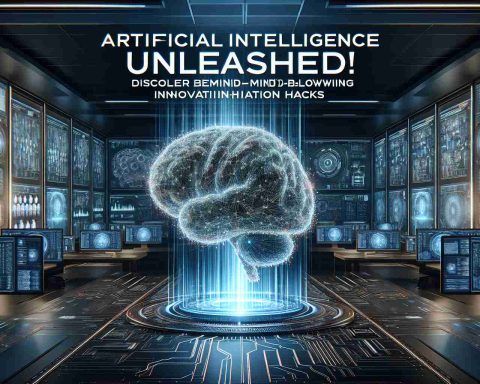In a world increasingly driven by artificial intelligence, NVIDIA emerges as a pivotal player not just on the stock market, but in shaping modern life. While NVIDIA’s recent stock surge in after-hours trading grabs headlines, the ripple effects of its AI innovations touch every facet of our daily existence. The real story lies in how these technological strides influence industries and the public at large.
NVIDIA’s AI advancements silently transform the mundane—from crafting personalized algorithms on your favorite streaming service to automating complex tasks in manufacturing and energy sectors. These enhancements underscore a quiet revolution facilitating smarter, more efficient systems worldwide. However, the revolution isn’t without its shadows. As AI becomes a workplace staple, concerns grow about potential job losses. The critical question: does AI herald a future of unemployment, or simply a shift to new roles demanding different skills?
In healthcare, NVIDIA’s AI breakthroughs promise targeted treatments and early diagnosis capabilities, potentially revolutionizing patient care. Yet, these systems stir debate around ethical AI use and patient data confidentiality—can these powerful tools remain unbiased and secure?
The ongoing AI evolution, marshaled by NVIDIA, presents communities with both opportunities and existential questions. Will governments step in with regulations to guide AI responsibly? Are our education systems evolving fast enough to prepare workers for an AI-centric job market? As society stands on the brink of these technological advancements, staying informed becomes imperative to harness AI’s benefits while mitigating its challenges.
NVIDIA’s AI Revolution: Bridging the Gap Between Progress and Preservation
NVIDIA’s advancements in artificial intelligence are not just transforming technology but also signaling profound impacts on various facets of life, particularly the environment. As AI systems become more efficient in optimizing energy use, their influence on reducing environmental footprints could be substantial. However, this same technological prowess brings challenges that echo through humanity, the economy, and our future world.
Environmental Impact
AI, led by companies like NVIDIA, offers vast potential to revolutionize how we interact with our planet’s resources. In the energy sector, AI-powered systems are already at work optimizing energy consumption and predicting maintenance needs, consequently reducing waste and emissions. For example, AI can precisely forecast solar panel output or streamline logistics to minimize fuel use. This not only helps in conserving natural resources but also supports the transition towards greener alternatives.
However, the environmental benefits of AI are countered by its substantial energy requirements. Training complex AI algorithms demands significant computational power, often involving large data centers that consume vast amounts of electricity and contribute to a significant carbon footprint. As AI becomes more embedded in daily operations, balancing its energy efficiency with its energy consumption remains a critical challenge.
Connections to the Future of Humanity
The dual nature of AI’s impact on the environment is a microcosm of its wider influence on humanity’s future. As AI patterns evolve, there is an opportunity for a broader implementation of sustainable technologies in other fields, fostering a new generation of eco-conscious innovations. This could be critical in combating climate change and promoting sustainability on a global scale.
Moreover, the intersection of AI with the global economy offers novel opportunities while prompting pivotal questions. As industries integrate AI to enhance productivity, there’s potential for unprecedented economic growth. Nonetheless, the transformation also requires a strategic reworking of job roles, demanding new skills and adjustments in educational frameworks.
To harness AI’s capabilities beneficially, humanity faces the task of developing robust policies and ethical guidelines. Governments are called upon to establish regulations that ensure sustainable and responsible AI deployment, balancing technological growth with environmental stewardship. In parallel, educational systems must adapt rapidly to equip future generations with the skills necessary for thriving in an AI-dominated landscape.
In essence, as NVIDIA and its contemporaries continue to innovate, the pathway they pave is intertwined with both challenges and opportunities. By acknowledging and addressing the environmental, societal, and economic implications of AI, humanity can steer towards a future where technological progress and sustainability not only coexist but enhance one another.
Unlocking the AI Revolution: NVIDIA’s Impact Beyond the Stock Market
Key Innovations and Trends: NVIDIA’s Role in AI Development
NVIDIA has firmly established itself as a trailblazer in artificial intelligence (AI), paving the way for innovations that reverberate across multiple sectors. As AI seamlessly integrates into various aspects of our daily lives, NVIDIA’s cutting-edge advancements play a central role in this transformative era.
Innovations in AI: Healthcare and Beyond
In healthcare, NVIDIA’s AI technologies are pioneering the way toward personalized medicine, enabling healthcare providers to deliver more precise and timely treatments. This involves leveraging AI algorithms to analyze complex medical data, which aids in early diagnosis and targeted therapies. However, with these advancements come pertinent ethical considerations. The importance of ensuring that AI systems uphold patient confidentiality and operate without bias cannot be overstated.
Potential and Challenges: A Double-Edged Sword
The increasing ubiquity of AI in sectors like manufacturing and energy reveals its dual nature. On one hand, AI-driven systems lead to increased efficiency and reduced operational costs. On the other, concerns about job displacement and the reshaping of the job market persist. The transition may necessitate a radical shift in workforce skills and roles, urging educational institutions to adapt curricula to meet future demands.
Regulatory and Educational Considerations
As AI’s influence grows, there is a pressing call for sound regulations to ensure ethical AI deployment. The government’s role in establishing guidelines that safeguard public interests and address AI’s societal impacts is crucial. Moreover, evolving educational frameworks to prepare individuals for new job roles in an AI-dominated landscape is paramount.
Market Analysis: NVIDIA’s Resilient Growth
NVIDIA’s stronghold in the AI sector is underscored by its impressive market performance. The company’s innovations continue to drive stock market gains, reflecting investor confidence and the broad potential of AI technologies. NVIDIA capitalizes on emerging trends, securing its position at the forefront of the AI revolution.
Sustainability and Predictions: The Road Ahead
In terms of sustainability, the emphasis on developing energy-efficient AI systems is increasingly critical. As NVIDIA remains committed to reducing the carbon footprint of its technologies, the future may see significant decreases in the environmental impact of AI applications. Looking ahead, the expansion of AI capabilities promises to usher in unprecedented opportunities, though it also poses challenges that society must address proactively.
For more insights into NVIDIA’s ongoing advancements and their global impact, visit NVIDIA.












